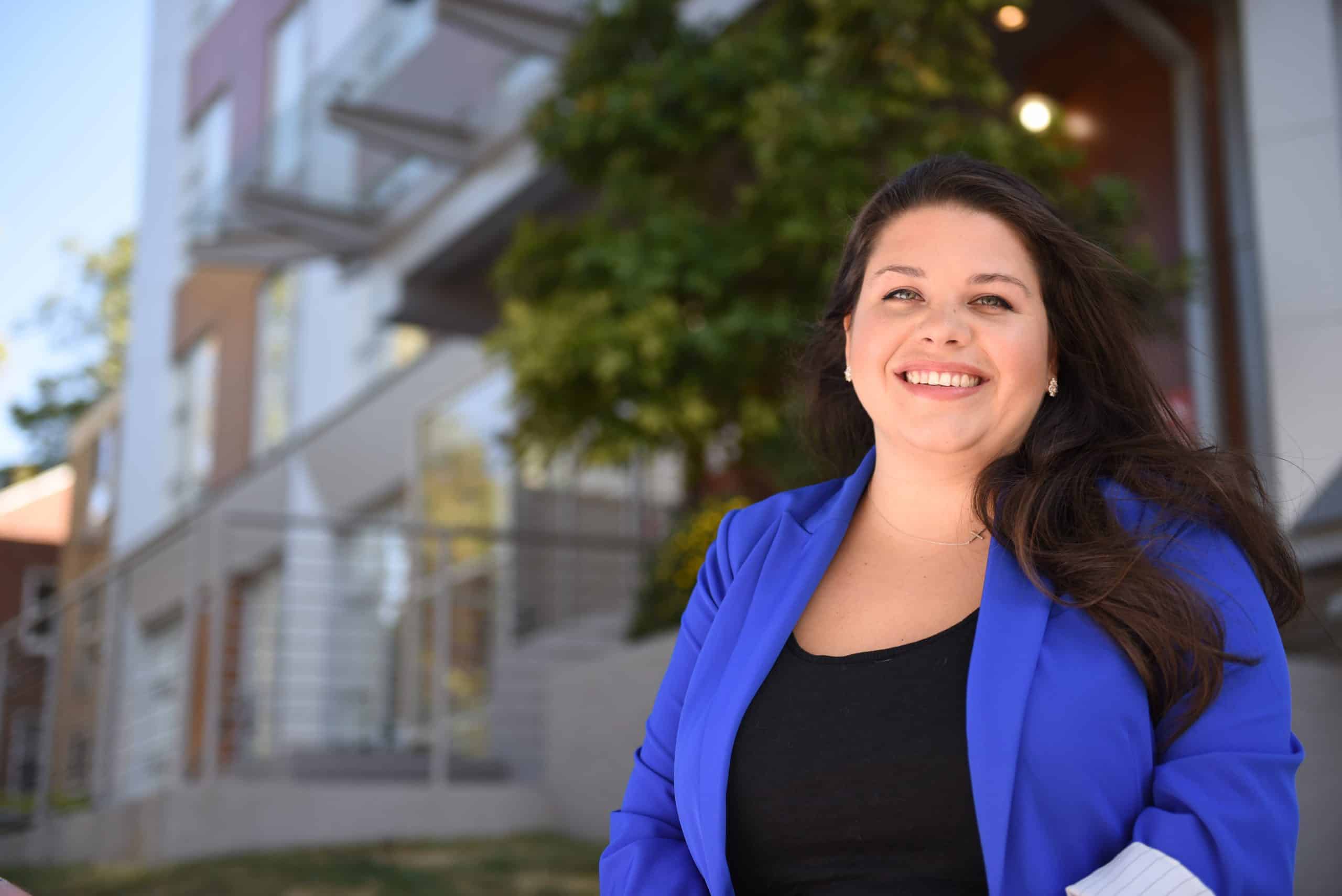
Trinity Graduates: Success and Satisfaction
In Fall 2019, we conducted a survey of Trinity graduates across the decades from 1950 to 2019. The results are quite remarkable. More than 1,000 alumnae and alumni from all degree programs responded; their answers provide eloquent testimonials to the values and worth of Trinity yesterday and today. Some of their powerful quotes are featured in this report. Here are some of the highlights of the survey:
Trinity Graduates: 1950-2019
- 93% of alumnae and alumni across all degree programs and decades report high satisfaction levels with their Trinity education.
- $80K is the median self-reported salary of Trinity graduates who are working across all decades and degree programs.
- $100K is the median self-reported salary of Trinity graduates from the decades of the ’70s, ’80s and ’90s, consistent with prime employment years.
- 95% of the survey respondents who are not retired are working or volunteering, and 77% of those who are working report they are employed in fields related to degrees they earned at Trinity or elsewhere in higher education.
- 57% of respondents earned master’s or doctoral degrees after graduating from Trinity. The top post-graduate destinations for Trinity alums to earn advanced degrees include Catholic, Georgetown, American, Harvard, George Washington, Howard and Columbia Universities, among many others.
While the overall data is not surprising, we wanted to know how the experience of our more recent graduates tracks with Trinity graduates overall. For graduates of Trinity’s baccalaureate programs from 2000 to 2019:
Trinity Graduates: 2000-2019
- 88% express high levels of satisfaction with their Trinity education.
- 98% are working, and 76% of those who are working are in fields related to their Trinity degrees (57%) or to degrees earned at other institutions; the small percentage who are not working are either retired or caring for family.
- $80K is the median self-reported salary.
- 52% earned advanced degrees at universities such as Howard University, University of Pennsylvania, University of Pittsburgh School of Law, Catholic University School of Law, University of Maryland, London School of Economics, Johns Hopkins University.
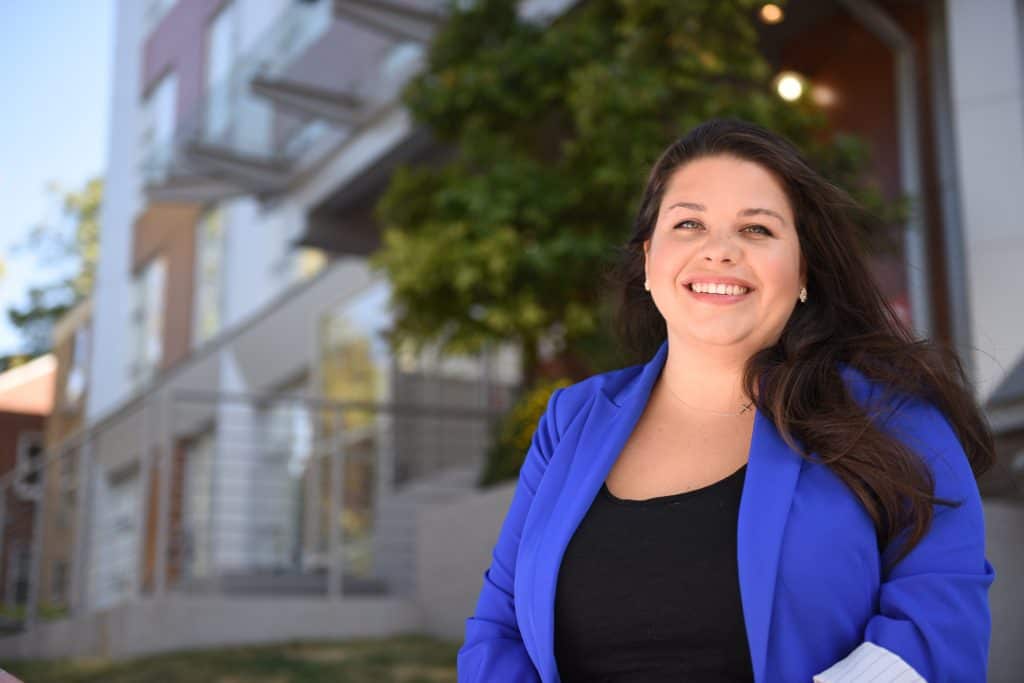
Morgan Carrillo ‘13, Social Worker
Employment of Trinity Graduates
Why is it important to know data like whether our graduates are working in fields related to their degrees, and how much they are earning? The federal government and policymakers want to know more about the “return on investment” for the considerable amount of taxpayer support that goes into higher education today. Federal financial aid is a big part of every institutional budget, including Trinity’s. Trinity students borrowed more than $12 million in federal loans in Fiscal 2019, and received more than $4 million in Pell grants, so the government wants to know that they are attending a university whose graduates become well employed.
Trinity graduates are remarkably well employed across an astonishing range of professions and positions. Alumnae across all decades report so many interesting and rewarding careers:
- A 2006 graduate reports on her work as a financial analyst and policy advisor for a major city government.
- A 1996 alumna worked for the Securities and Exchange Commission after law school and then joined a private firm advising clients on SEC compliance issues.
- A 2002 graduate went on to study at the London School of Economics and now works in international development at the United Nations.
- A 1976 psychology major founded an organization known as Pals for Life, a pet therapy program serving a major metropolitan area.
- A 2008 alumna was an Air Force officer and now is in the Air Force reserves working in the intelligence field.
- A 1976 political science graduate specializing in national security policy rose through the ranks at the Department of State to become President Obama’s Ambassador for Nuclear Non-Proliferation before her retirement in 2012.
- A 1968 political science alumna studied law at the University of Puerto Rico, worked in commercial litigation and later became the chief judge of the U.S. Bankruptcy Court for the District of Puerto Rico.
Some of our most recent graduates, from the decade 2011 to 2019, report these kinds of positions (following is just a sample of the wide range of careers for our most recent grads):
- Editor for an inspector general
- Kindergarten teacher in area public school system
- Registered nurse at the Department of Health and Human Services
- Psychology technician working with support services for active duty Army officers
- Consultant with risk and advisory practice of a major accounting firm
- Manager with the Department of Insurance, Securities and Banking
- Social services representative with Department of Human Services
- Hearing officer in a major city Office of Collective Bargaining
- Community education specialist with Children’s National Child Health Advocacy Institute
The Value of a Liberal Arts Education
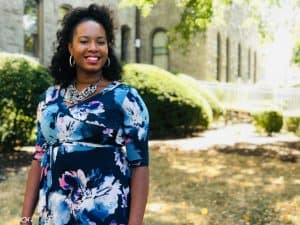
Anasatasia Adams ‘12, Counselor and Entrepreneur
The versatility of a liberal arts education comes through in the replies to our alumnae survey. More than half of respondents from all decades report that they have completely changed their career fields three or more times, and sometimes life circumstances drive the change. Pausing professionally to raise children, follow a spouse’s career, take care of aging parents or other loved ones are all part of the lives of Trinity graduates.
- One alumna writes about how she started out on Wall Street in finance, but paused to take care of family, and then became a business officer with a university, and then on to financial management with a medical practice.
- Another writes that with her art history degree she started at the National Trust for Historic Preservation but then moved into her longtime position as a Foreign Service officer where her liberal arts degree was very valuable.
- An alumna started in human resources for a Wall Street firm, stopped out to raise children, then went into commercial insurance and real estate.
- A biology major started out in teaching and then became a major executive with IBM.
- A Russian major started out with the IRS before migrating to banking and then onto marketing and later, community advocacy.
- With a double major in history and classics, this alumna went from interpretative work for the National Park Service to investigations for the Office of Personnel Management to financial analysis with the U.S. Department of Education.
- A history major started out as a cryptanalyst with the National Security Agency because of her facility with languages, and later became a human resource development specialist for federal agencies as well as commercial businesses.
- A psychology graduate started out in Naval Intelligence and then became a philosophy professor and later a dean.
These few stories are exemplars of the hundreds of stories in the alumnae survey recounting career changes and very satisfying professional lives. The common theme throughout the survey is the critical value of a liberal arts education to enable a person to do well in a broad range of positions, to seize new opportunities, to change career fields adroitly. Working in volunteer capacities – working for social justice – is also a prominent theme across the decades. Trinity Women never rest!
Several graduates shared thoughtful comments about the importance of the liberal arts:
“I’m employed at the U.S. Department of State. A large part of the work we do is connecting with people all over the world… Liberal arts is a vital part of diplomacy in the modern era. Without exposure to liberal arts coursework I do not believe I would be as skilled in my chosen profession.”
“We don’t even know what jobs there will be in the future – thinking skills and creativity are the keys to the future – that’s what a liberal arts education delivers!”
“We need a happy medium. It does no good to society to have techies/scientists who do not know the evolution and revolutions in the world as forces of change, nor to have intellectuals who do not have a clue how to interpret a financial statement.”
“Would I have found time to take a painting class, art history, read about the Arthurian legend, study history and read a wide variety of classic books if it hadn’t been for my education at Trinity? My Trinity education has added so much to my personal growth as a human being as well as to my career path. I am thankful for it all the time.”
Lifelong Learning and Continuing Education
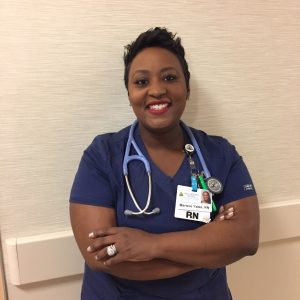
Martece Yates ‘16, Family Care Nurse
We asked our graduates if they would like to have more opportunities to engage in formal learning and continuing education, and what modalities would make sense for them. Not surprisingly, the overwhelming sentiment across the decades was affirmative. Interestingly enough, nearly half of the 634 responses to the continuing education question said that they would consider taking a course online. Even retired alumnae indicated that they would consider taking an online enrichment course if the topic appealed to them.
Many of the respondents said they would be interested in coming back to Trinity for specialized certifications and advanced degrees, as well as enrichment.
Even more interesting, the topics that Trinity graduates would like to study through continuing education programs are quite extensive, including: Artificial intelligence, cyber security, information technology, digital media and communication, data analytics, religion and spirituality, entrepreneurship, psychology and mental health, project management, global affairs, social justice, virtual book club, art and music, conflict mediation and negotiation, current politics, addiction and recovery.
We will be communicating more with alumnae and alumni about programs tailored to your interests. We are eager to engage you in continuing education courses and even to welcome you back to campus for academic programs and intellectually stimulating events! Watch your mailboxes for more on Trinity’s plans for more lifelong learning for Trinity graduates!
Trinity: Change and Stability Across the Generations
Many alumnae responding to the survey commented on the changes that have occurred at Trinity over the years, with some expressing pride in the ways in which Trinity as adapted, and others expressing concerns about whether the changes have also produced losses in cherished values. In fact, the losses are fewer than some might think, and the gains are tremendous. Here are answers to some of the most frequently cited issues that came through the surveys:
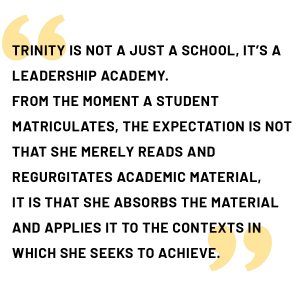 Is Trinity still a women’s college?
Is Trinity still a women’s college?
Yes! Trinity is still a women’s college, and also a diversified university with some coeducational programs. We have the “best of all possible worlds” in ways that are similar to the development of other historic women’s colleges with diversified populations. Our full-time daytime undergraduate program is still a women’s college – still Trinity College, also known as the College of Arts and Sciences. The enrollment in this program is nearly 1,000 women, mostly young women. In our graduate and professional undergraduate programs, our population is about 95% female; in those programs, men account for just about 5% of students. Trinity’s commitment to women’s education remains strong.
How much debt do Trinity students carry today?
Student debt burden is a serious issue throughout higher education today, and this is the reason why charitable gifts to support student scholarships are so important. The average debt burden of recent Trinity graduates is about $30,000, which matches the national average.
Is Trinity still Catholic?
Yes! We live by the values of the Sisters of Notre Dame de Namur and the Catholic faith tradition, animated by the Gospel teachings on social justice. While most of our students profess many different faiths, they find at Trinity the kind of personal, intellectual and spiritual enrichment that helps them to develop as more complete human beings, which is the work of Catholic education. We offer our students a sense of hope, of empowerment to achieve economic stability for themselves and their families, and the ability to give witness to their values in their own work.
Does Trinity still promote the liberal arts?
Yes! Trinity’s entire foundation for learning rests upon the liberal arts. All undergraduate students in all major programs must take the general education core that includes all of the liberal arts disciplines. While many students today choose major programs in professional fields such as business, nursing, criminal justice, communication, all of those disciplines insist upon a strong foundation in English, history, ethics and philosophy, psychology and other liberal arts disciplines.
Many thanks to the more than 1,000 alumnae and alumni who answered our survey! We are still analyzing the results and we will be using them to inform ongoing strategic planning.